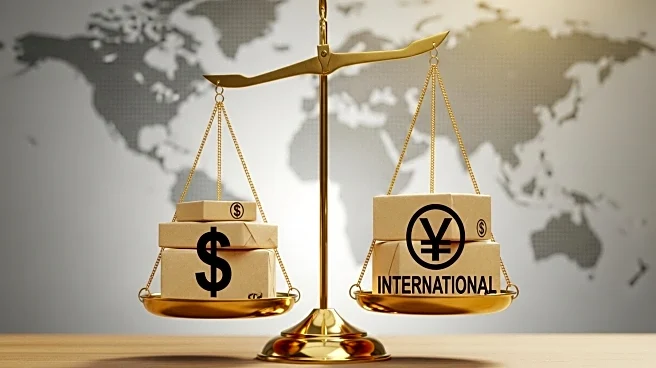What's Happening?
The exemption for small-value packages under $800 from tariffs has ended, effective August 29, 2025. This change, initiated by President Trump, means that packages shipped into the U.S. will now be subject to additional taxes based on their country of origin's tariff rate. To facilitate a smooth transition, the administration has introduced a six-month option allowing shippers to pay a flat fee ranging from $80 to $200 per item, depending on the country of origin's tariff rate. The move aims to rebalance trade and restrict the importation of illegal goods, including narcotics. Senior counselor Peter Navarro stated that ending the 'deadly de minimis loophole' could generate up to $10 billion in tariff revenues and enhance safety by curbing the flow of dangerous items.
Why It's Important?
The termination of the tariff exemption for small-value packages is significant for several reasons. It is expected to increase import costs for consumers and businesses, particularly those relying on e-commerce platforms for goods from abroad. The policy change is part of President Trump's broader trade strategy to protect domestic industries and address trade imbalances. Additionally, it aims to combat the smuggling of illegal goods, which often occurs through small packages. Major shipping companies like UPS, FedEx, and DHL have indicated their readiness to adapt to the new regulations, suggesting that the logistics industry is prepared for the transition. However, consumers may experience price increases and potential delays as the new system is implemented.
What's Next?
The next steps involve monitoring the impact of the new tariff policy on import costs and consumer behavior. The administration will assess the effectiveness of the flat fee option during the six-month transition period. There may be further adjustments based on feedback from stakeholders, including shipping companies and consumers. Additionally, U.S. Customs and Border Patrol will play a crucial role in enforcing the new regulations and ensuring compliance. The administration may also engage with foreign postal services to improve their package policing efforts, as expressed by Peter Navarro.
Beyond the Headlines
The end of the tariff exemption could have broader implications for international trade relations, particularly with countries like China and Hong Kong, which were previously benefiting from the loophole. It may also influence global shipping practices and encourage foreign postal services to enhance their security measures. The policy change reflects a shift towards stricter trade regulations and could set a precedent for future tariff adjustments.









